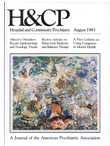The Peer-Managed Small Group Versus the Rehabilitation Model of Treatment of Chronic Patients
Abstract
The Fairweather small-group model, developed some 20 years ago, has been proven to be an effective form of treatment for chronic patients who have spent long years in institutions. However, there have been no recent evaluations of how small-group programs work compared with contemporary rehabilitation programs and how effective they are with the "new chronic patient" recently described in the literature. In a study of such patients at the Florida Mental Health Institute in 1977, the authors compared matched patients in a small-group program and a rehabilitation therapy program on measures of self-concept, perception of kind and degree of help received, and recidivism rate. They found that patients in the small-group program spent significantly less time in treatment. Moreover, the small-group program was effective in reducing recidivism over an 18-month period and was less expensive than the rehabilitation therapy program.
Access content
To read the fulltext, please use one of the options below to sign in or purchase access.- Personal login
- Institutional Login
- Sign in via OpenAthens
- Register for access
-
Please login/register if you wish to pair your device and check access availability.
Not a subscriber?
PsychiatryOnline subscription options offer access to the DSM-5 library, books, journals, CME, and patient resources. This all-in-one virtual library provides psychiatrists and mental health professionals with key resources for diagnosis, treatment, research, and professional development.
Need more help? PsychiatryOnline Customer Service may be reached by emailing [email protected] or by calling 800-368-5777 (in the U.S.) or 703-907-7322 (outside the U.S.).



